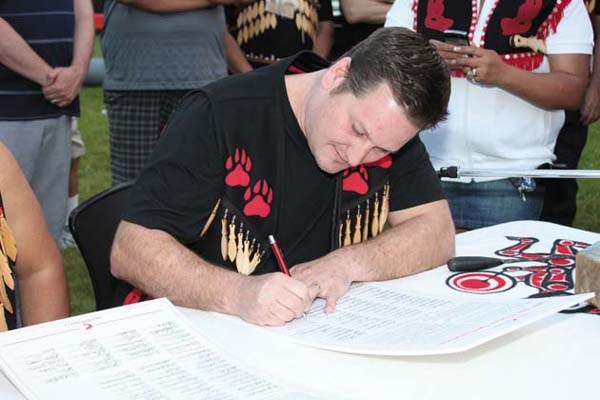A First Nation with traditional territory in Burnaby took another stance against the proposed Kinder Morgan pipeline expansion this past weekend.
On behalf of the Tsleil-Waututh Nation, elected chief Justin George signed a declaration to save the Fraser River on Saturday, reaffirming the group's opposition to the proposed twinning of the Trans Mountain pipeline.
"We see the risks in this way too high," George told the NOW.
The pipeline ships oil from Alberta to Burnaby, where tankers fill up with crude at the Westridge Marine Terminal in the Burrard Inlet inside the nation's traditional territory.
According to George, the nation is concerned about the day-to-day operation of the pipeline, the proposed expansion and the associated increase in tanker traffic.
"The Vancouver port is challenging to navigate," George said. "It's called the Second Narrows for a reason - because it's narrow. - We see human error as inevitable. In terms of an accident, we don't think 'if,' we think 'when?'"
The Trans Mountain pipeline transports up to 300,000 barrels of oil per day, but Kinder Morgan wants to increase capacity to 750,000 barrels by adding a twin line. The Tsleil-Waututh reserve is in North Vancouver, across the water from the Westridge Marine Terminal, but the group has traditional territory all around the inlet.
Tsleil-Waututh means people of the inlet, and the nation has a saying: "When the tide went out, the table was set."
"As a young boy, we could harvest the clams, the cockles, the oysters," George said. "Today, the Burrard Inlet is a complete dead zone for shellfish."
George blamed major industry, especially oil, for the pollution and loss of edible shellfish.
Before signing the declaration on Saturday, the nation also hosted a traditional ceremony, with various business, environmental and First Nations groups as invited guests.
"For us, it's about educating the public and creating awareness
about the proposal that's in our territory and Greater Vancouver," George said.
George seemed confident the nation could stop the project.
"We have aboriginal rights and title, and we'll ensure those are respected and upheld in the process," he said. "We have inherent rights to self-government; we've never deeded or ceded the land. - We don't see any monetary value that can compensate the risks that are associated with this project."
Kinder Morgan spokesperson Lexa Hobenshield confirmed
that the existing and proposed twin pipeline is in the traditional territory of the Tsleil-Waututh Nation.
"We are just getting underway with an open and thorough engagement along the route and marine corridor with aboriginal groups, landowners, communities and stakeholders," she wrote in an email to the NOW. "We value our relationships with aboriginal groups in whose territories we operate and recognize and appreciate that aboriginal groups' interests and responsibilities are unique. We are committed to open, transparent dialogue and mutually beneficial working relationships."
Hobenshield said the company believes that engagement with aboriginal governments and peoples is important for ongoing operations and new projects.
"We have been seeking the opportunity to meet with Tsleil-Waututh for some time now. While they have advised they are not ready to meet with us yet, we stand ready to provide information to them and to meet with them at any time," Hobenshield said. "We recognize that there will be some opposition to our project. This is about a balance of interests. We are committed to an extensive and thorough engagement on all aspects of the project with communities along the proposed route and marine corridors."
Hobenshield said that results from the public hearing process will be the basis of Kinder Morgan's application to the National Energy Board, which will determine if the project is in the public's interest.



